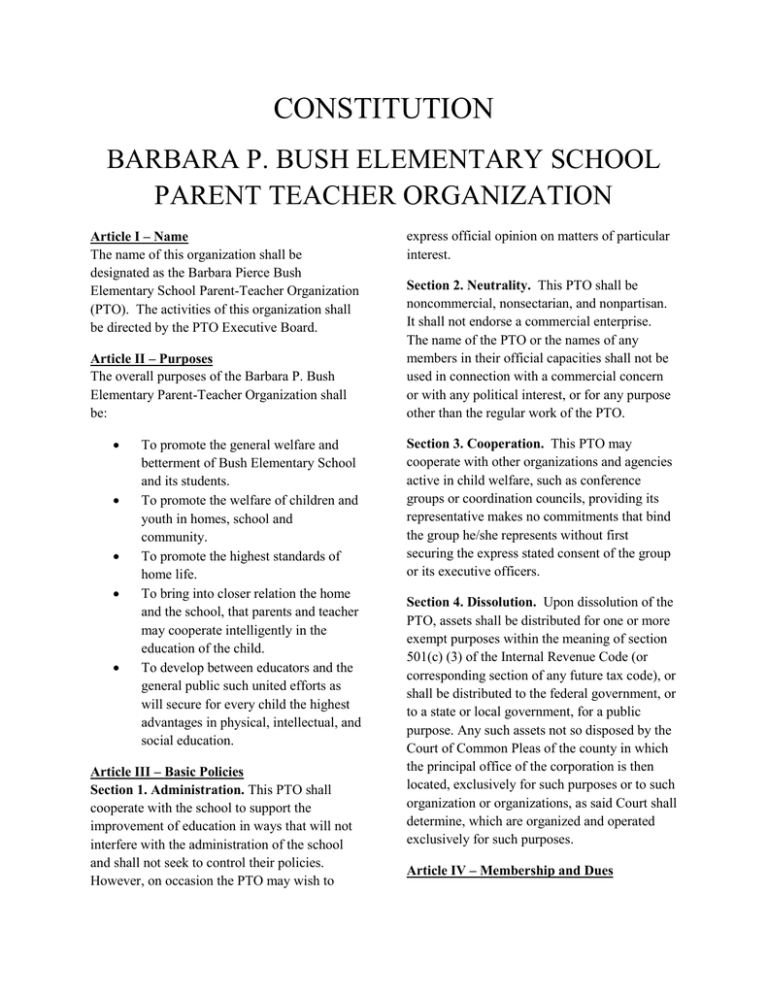CONSTITUTION BARBARA P. BUSH ELEMENTARY SCHOOL PARENT TEACHER ORGANIZATION
advertisement

CONSTITUTION BARBARA P. BUSH ELEMENTARY SCHOOL PARENT TEACHER ORGANIZATION Article I – Name The name of this organization shall be designated as the Barbara Pierce Bush Elementary School Parent-Teacher Organization (PTO). The activities of this organization shall be directed by the PTO Executive Board. Article II – Purposes The overall purposes of the Barbara P. Bush Elementary Parent-Teacher Organization shall be: To promote the general welfare and betterment of Bush Elementary School and its students. To promote the welfare of children and youth in homes, school and community. To promote the highest standards of home life. To bring into closer relation the home and the school, that parents and teacher may cooperate intelligently in the education of the child. To develop between educators and the general public such united efforts as will secure for every child the highest advantages in physical, intellectual, and social education. Article III – Basic Policies Section 1. Administration. This PTO shall cooperate with the school to support the improvement of education in ways that will not interfere with the administration of the school and shall not seek to control their policies. However, on occasion the PTO may wish to express official opinion on matters of particular interest. Section 2. Neutrality. This PTO shall be noncommercial, nonsectarian, and nonpartisan. It shall not endorse a commercial enterprise. The name of the PTO or the names of any members in their official capacities shall not be used in connection with a commercial concern or with any political interest, or for any purpose other than the regular work of the PTO. Section 3. Cooperation. This PTO may cooperate with other organizations and agencies active in child welfare, such as conference groups or coordination councils, providing its representative makes no commitments that bind the group he/she represents without first securing the express stated consent of the group or its executive officers. Section 4. Dissolution. Upon dissolution of the PTO, assets shall be distributed for one or more exempt purposes within the meaning of section 501(c) (3) of the Internal Revenue Code (or corresponding section of any future tax code), or shall be distributed to the federal government, or to a state or local government, for a public purpose. Any such assets not so disposed by the Court of Common Pleas of the county in which the principal office of the corporation is then located, exclusively for such purposes or to such organization or organizations, as said Court shall determine, which are organized and operated exclusively for such purposes. Article IV – Membership and Dues Section 1. Eligibility. Any teacher, staff member, parent or guardian or a student attending Bush Elementary school who subscribes to the objectives and basic policies of the Bush PTO may become a member of the organization, subject only to compliance with the provisions of the constitution. Membership in the organization shall be available without regard to race, color, creed, or national origin. PTO President and sent home with students at least one (1) week prior to the meeting date. The notice shall specify the place, date, hour and purpose of the meeting. It shall be the responsibility of the person(s) calling the special meeting to arrange for notices to be sent to the member at least three (3) days prior to such a meeting. The specific purpose of special meeting shall appear on all notices. Section 2. Dues. Each member shall pay annual dues to the PTO. The amount of the dues is determined by the Board. Section 4. Quorum. A quorum shall be the members present at any general meeting. Section 3. Membership. A membership drive shall be conducted during the fall semester of the school year. New members shall be accepted at any time. The PTO membership year shall run concurrently with the school year. Section 4. Resignation. Any member may resign by filing a written resignation with the Secretary. Section 5. Termination of Membership. After an appropriate hearing, the entire Board, by its majority vote, may suspend or expel a member for just cause. Article V – Meeting of Members Section 1. General Meetings. Regular meetings of the PTO shall be held as scheduled by the Board with there being at least one meeting in the fall and one in the spring semester. An election of officers shall be conducted at a general PTO meeting in the spring semester. Section 5. Voting Rights. On all matters brought to a vote before the general membership, all members shall have one (1) vote. Section 6. Measure Passage. A simple majority of the quorum is needed to pass any measure. Section 7. Proxies. No member may cast a vote by proxy. Article VI – PTO Executive Board Members Section 1. Board members. The PTO Executive Board, at a minimum, shall be made up of 18 Board Members and one administrator and one teacher representative. All members of the Board must be members of the PTO in good standing (i.e. be current on dues). Section 2. Special Meetings. Special meetings of the members may be called at any time by the President or the Board or upon the written request of twenty (20) percent of the membership. Section 2. PTO Executive Board. The members of the Board, at a minimum, shall be: President, Vice President, Secretary, Treasurer, Fundraising Chairperson (2), School Store Chairperson (2), VIPS Chairperson (2), Safety Chairperson, Hospitality for Teachers Chairperson (2), Hospitality for Families Chairperson, Directory Chairperson (2), Business Partnerships Chairperson, and Nature Center Chairperson. Section 3. Notice of Meeting. Written notices of the general meetings shall be provided by the Section 3. Terms of Office. These officers shall be elected at the spring meeting of the general PTO membership. They shall hold office for one year, the tem beginning on July 1st. All Board members serve in a voluntary capacity. Board members may be elected for 3 consecutive terms. Section 4. Vacancy. Any vacancy on the Board shall be filled by majority vote of the members on this board. This change will be voted on at the next general meeting of the members. Section 5. Removal from Office. After an appropriate hearing, the entire Board by its majority vote may expel a Board member for just cause. Article VII – Nomination and Election of Board Members Section 1. Nominating Committee. The nominating committee shall consist of five members. One shall be the elected faculty representative and the four others shall be chosen by majority vote of the PTO Executive board. Of those chosen, one shall come from the Board and the others shall come from the general PTO membership. The principal shall serve as an ex-officio member. Members of the nominating committee are not barred from becoming nominees. The committee shall prepare a slate of nominees for each office to be presented to the board. At the spring meeting, the committee members shall be available to assist the President. They shall also be called upon by the president in the event a ballot vote is necessary. Section 2. Notification. The slate of nominees shall be included with the notice of the spring meeting. Section 3. Election. The President shall introduce the slate of nominees at the spring meeting, at which time additional nominations may be made from the floor. The names of all nominees shall be posted in sight of all present at the meeting. Article VIII – Functions of the Board Section 1. Meetings. A Board meeting shall be held prior to each of the general meetings of the PTO. The time and place of the regular Board meeting shall be set by the Board at its first meeting of the year. A majority of the members of the Board shall constitute a quorum. Special meetings of the Board may be called by the President or by a majority of the Board members present, by giving at least twenty-four hour notice to each board member. Section 2. Duties of the Board. The duties of the Board shall be: To transact necessary business in the intervals between PTO meetings. To create or dissolve special committees. To approve the plans and work of all the committees. To present a report at the general meetings of the PTO. To appoint an auditor or an auditing committee to review the Treasurer’s final report for the annual meeting. To prepare and submit to the PTO for approval an annual budget at the first general meeting of each school year. To approve routine bills within the limits of the budget. The principal and one elected officer may approve expenditures on non-budgeted items up to $300.00 without approval of the Board. A report of such expenditures shall be given to the Board at its meeting. To reassign budgeted monies not spent during the year. Article IX – Duties of Board Members Section 1. President. The President shall preside at all meetings of the PTO and of the Board; shall be ex-officio member of all committees; shall be a signer on the PTO’s bank account(s); shall appoint special committee chairpersons; shall coordinate the work of the Board members and committees in order that the objectives may be promoted; and shall perform such other duties as may be prescribed in this Constitution or assigned to the President by the PTO Board. Section 2. Vice President. The Vice President shall act as an aide to the President; shall perform the duties of the President in the absence or the inability of that member to serve; shall be a signer on the PTO’s bank account(s) and shall coordinate the PTO membership drive and any other activities as designated by the President. Section 3. Secretary. The Secretary shall prepare the minutes of all meetings of the PTO and the Board; shall present the minutes of each meeting at or prior to the next meeting; shall send out notice of Board meetings and conduct the correspondence of the PTO. The Secretary shall maintain a list of names and addresses of all members of the Board. The Secretary shall keep a copy of the Barbara P. Bush Elementary PTO Constitution and amendments and shall present copies of these to the newly elected Board members. Additionally, the Secretary shall be a signer on the PTO’s bank account(s); review all checks issued by the Treasurer each month and review the monthly bank reconciliations provided by the Treasurer each quarter. Section 4. Treasurer. The Treasurer shall have custody of, and be responsible for, all funds and financial records of the PTO. The Treasurer shall receive cash deposits for the organization in the presence of another board member or coordinator. The Treasurer shall provide a written receipt anytime funds exchange hands. The Treasurer shall then make deposits in a timely manner. The Treasurer shall pay expenses in accordance with the approval of the executive board. The Treasurer shall keep the financial records in QuickBooks and routinely provide the board with a back-up copy for safe keeping. The Treasurer shall present a financial statement consisting of a balance sheet, profit and loss statement and a list of non-budgeted expenditures to the Board at each meeting and/or at any time requested. The Treasurer shall also present all checks monthly to the Secretary for review and authorization. Any expense checks written to the Treasurer must be signed by another member of the board. The treasurer may not sign any checks for his/her own personal reimbursement. The Treasurer will report and pay sales tax to the State Comptroller each quarter, renew the PTO’s incorporation with the state annually and file Form 990/990EZ with the IRS annually. The Treasurer will make a full report at the end of each year and provide the review committee with a complete set of books for the review. In the absence or inability of the Treasurer to serve, one of the other signatories may act as primary signatory. Section 5. Fundraising Chairperson(s). The Fundraising Chairperson(s) shall research and oversee all projects which the Board may approve to raise funds, promote school spirit, or observe special events. Section 6. School Store Chairperson(s). The School Store Chairperson shall be responsible for the School Supply presale and for the operation of the School Store during the year. They shall create an inventory list of items that remain on hand at the end of each school year. Section 7. VIPS Chairperson(s). The School Volunteer Chairperson(s) shall be members of the HISD Volunteers in Public Schools (VIPS); shall serve as chairpersons of the Barbara P. Bush VIPS; and shall act as liaisons between the Board and the VIPS in Barbara P. Bush Elementary. Section 8. Safety Chairperson. The Safety Chairperson shall be concerned with the general safety of all students and shall work in conjunction with the school administration, faculty, and student patrols. Section 9. Hospitality for Teachers Chairperson(s) and Hospitality for Families Chairperson(s). These chairpersons shall be responsible for coordinating a committee to provide refreshments at functions deemed appropriate by the Board and/or Principal. Section 10. Publicity Chairperson. The Publicity Chairperson shall publicize all meetings of the PTO, VIPS, and school functions; shall provide information for publishing articles in neighborhood newsletters, HISD Reports, local newspapers, and posters in and around the school; and shall keep the marquee and online communications up to date with pertinent information on happenings at the school. Section 11. Directory Chairperson(s). The Directory Chairperson(s) shall be responsible for creating a school-wide directory to be distributed to each registered PTO member in the fall semester. Section 12. Business Partnerships Chairperson(s). The Business Partnerships Chairperson (s) shall coordinate monthly community partnership events by working closely with neighborhood businesses to form activities with the school. Section 13. Nature Center Chairperson. The Nature Center Chairperson shall oversee the regular maintenance of the Nature Center and schedule special projects throughout the year involving students, parents and teachers. The Nature Center Chairperson shall also manage the Terra-Cycle juice pouch recycling program monthly. Article X – Coordinators Section 1. Art Coordinator. The Art Coordinator will assist the Art Teacher with special projects and/or fundraisers throughout the year. Section 2. Birthday Book Club Coordinator. The Birthday Book Club Coordinator shall organize a fundraising campaign allowing parents to donate a book selected by their child to the school library in honor of the student’s birthday. The Birthday Book Club Coordinator shall take monthly pictures of the birthday club members and display the pictures in the front of the school, give the office staff a list of birthdays to be announced during morning announcements, affix labels to the donated library books and maintain a membership list for the Treasurer. Section 3. Library Coordinator. The Library Coordinator will assist the Library Teacher with special projects and/or fundraisers throughout the year. Section 4. Music Coordinator. The Music Coordinator will assist the Music Teacher with special projects and/or fundraisers throughout the year. Section 5. Yearbook Coordinator(s). The Yearbook Coordinator(s) shall capture school memories throughout the year and be responsible for the planning, designing and printing of a yearbook. The Yearbook Coordinator(s) shall also promote, sell and manage the distribution of the yearbooks. Section 6. Additional Coordinators. The board may appoint additional coordinators as needed. ARTICLE XI – Constitution Section 1. Amendments. This Constitution may be amended at any general meeting of the PTO. The Board shall review the proposed amendments before the meeting. One week prior to the general meeting, notice of the proposed amendments shall be provided to the membership by the President or his/her appointee. The proposed amendments shall be read at the general meeting with a two-thirds majority vote of the members present required to ratify the amendments. By September 30, copies of the constitution currently in force shall be available to all PTO members should they request them. ARTICLE XII – Miscellaneous Section 1. Books and Records. The PTO shall keep correct and complete records of its accounts. It shall also keep minutes of the proceedings of all Board meetings and general meetings. A current list of names and addresses of all Board members shall be kept in the school office. All books and records of the PTO shall be available for inspection by members of their agents. Section 2. Fiscal Year. The fiscal year of the PTO shall begin on July 1, and end on June 30 of the following year. Section 3. Use of Funds. No part of the net earnings of the corporation shall inure to the benefit of, or be distributable to, its members, trustees, officers, or other private persons, except that the corporation shall be authorized and empowered to pay reasonable compensation for services rendered and to make payments and distributions in furtherance of the purposes set forth. No substantial part of the activities of the corporation shall be the carrying on of propaganda, or otherwise attempting to influence legislation, and the corporation shall not participate in, or intervene in (including the publishing or distribution of statements) any political campaign on behalf of or in opposition to any candidate for public office. Section 4. Collection of Funds. Any monies collected via cash or check are required to be counted by two separate individuals and documented by those individuals with at least one of those persons being a member of the PTO Board before leaving the school’s premises. Article XIII – Conflict of Interest Policy Section 1. Purpose. The purpose of the conflict of interest policy is to protect this tax-exempt organization’s interest when it is contemplating entering into a transaction or arrangement that might benefit the private interest of member of the Board or might result in a possible excess benefit transaction. This policy is intended to supplement but not replace any applicable state and federal laws governing conflict of interest applicable to nonprofit and charitable organizations. Section 2. Definitions. a. Interested Person. Any Board member, who has a direct or indirect financial interest, as defined below, is an interested person. b. Financial Interest. A person has a financial interest if the person has, directly or indirectly, through business, investment, or family: i. An ownership or investment interest in any entity with which the organization has a transaction or arrangement; ii. A compensation arrangement with the organization or with any entity or individual with which the organization has a transaction or arrangement; or iii. A potential ownership or investment interest in, or compensation arrangement with, any entity or individual with which the organization is negotiating a transaction or arrangement. “Compensation” includes direct and indirect remuneration as well as gifts or favors that are not insubstantial. A financial interest is not necessarily a conflict of interest. Under Section 3b, a person who has a financial interest may have a conflict of interest only if the appropriate governing board or committee decides that a conflict of interest exists. Section 3. Procedures. a. Duty to Disclose. In connection with any actual or possible conflict of interest, an interested person must disclose the existence of the financial interest and be given the opportunity to disclose all material facts to Board who are considering the proposed transaction or arrangement. b. Determining Whether a Conflict of Interest Exists. After disclosure of the financial interest and all material facts, and after any discussion with the interested person, he/she shall leave the board meeting while the determination of a conflict of interest is discussed and voted upon. The remaining board members shall decide whether a conflict of interest exists. c. Violations of the Conflict of Interest Policy. i. If the board has reasonable cause to believe a member has failed to disclose actual or possible conflicts of interest, it shall inform the member of the basis for such belief and afford the member an opportunity to explain the alleged failure to disclose. ii. If, after hearing the member’s response and after making further investigation as warranted by the circumstances, the board determines that the member has failed to disclose an actual or possible conflict of interest, it shall take appropriate disciplinary and corrective action. Section 4. Records of Proceedings. The minutes of the board shall contain: the names of the persons who disclosed or otherwise were found to have a financial interest in connection with an actual or possible conflict of interest; the nature of the financial interest; any action taken to determine whether a conflict of interest was present; and the board’s decision as to whether a conflict of interest in fact existed. Section 5. Compensation. A voting member of the board who receives compensation, directly or indirectly, from the organization for services is precluded from voting on matters pertaining to that member’s compensation. Section 6. Annual Statements. Each Board shall annually sign a statement which affirms that such person: • Has received a copy of the conflict of interest policy; • Has read and understood the policy; • Has agreed to comply with the policy; and • Understands that the organization is charitable and that in order to maintain its federal tax exempt status it must engage primarily in activities which accomplish one or more of its tax-exempt purposes. Section 7. Periodic Reviews. To ensure that the organization operates in a manner consistent with charitable purposes and does not engage in activities that could jeopardize its tax-exempt status, periodic reviews shall be conducted. The periodic reviews shall, at a minimum, include the following subjects: a. Whether compensation arrangements and benefits are reasonable, are based on competent survey information, and are the result of arm’s length bargaining. b. Whether partnerships, joint ventures, and arrangements with management organizations conform to the organization’s written policies, are properly recorded, reflect reasonable investment or payments for goods and services, further charitable purposes, and do not result in inurement, impermissible private benefit, or an excess benefit transaction. Section 8. Use of Outside Experts. When conducting the periodic reviews as provided for in Section 7, the organization may, but need not, use outside advisers. If outside experts are used, their use shall not relieve the governing board of its responsibility for ensuring that periodic reviews are conducted.


